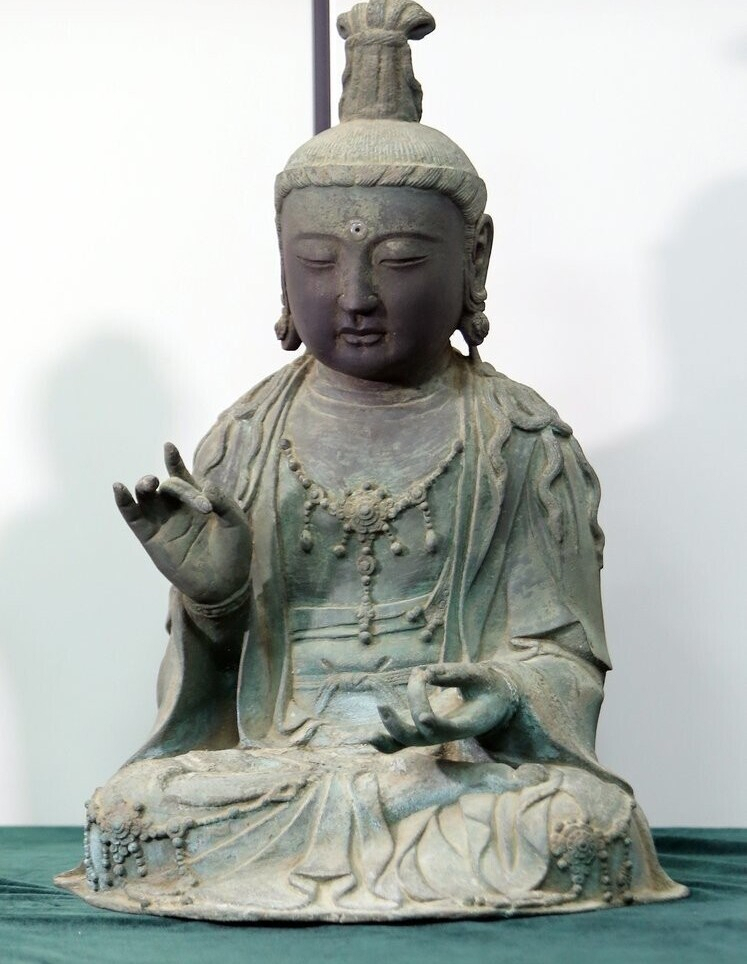Supreme Court dismisses Buseoksa's appeal in Bodhisattva statue ownership dispute
By Kim Hae-yeonPublished : Oct. 26, 2023 - 15:48

The Supreme Court ruled Thursday against a Korean Buddhist temple's ownership claim to a 14th-century Bodhisattva statue that it argues was plundered by Japanese pirates in the late Goryeo era. The highest court ruled that the statue, stolen from a Japanese temple by a Korean theft group, rightfully belongs to Japan.
The final ruling was based on Japan's Kannonji Temple's "acquisitive prescription" of the statue, the court said.
The law governing the ownership of the statue falls under Japanese civil law, which states that a person or entity may acquire ownership of property "even if it did not originally belong to them," as long as they possess it "peacefully and openly" for a minimum of 20 years. Kannonji Temple officially registered itself as a legal entity in January 1953, indicating their continuous possession of the statue since then.
The case harks back to October 2012 when a Korean theft group smuggled the gilt-bronze seated Bodhisattva statue, which was housed at Kannonji Temple in Nagasaki prefecture, along with one other statue from Kaijin Shrine. The statue is 50.5-centimeter high and weighs 38.6 kilograms.
In early 2013, the thieves were arrested and prosecuted, after a joint investigation by the National Police Agency and the Cultural Heritage Administration. The Korean government immediately confiscated the statue and kept it in custody at the National Institute of Cultural Heritage in Daejeon.
In the same year, Buseoksa, a Korean temple in Seosan, South Chungcheong Province, filed for a temporary injunction to halt the statue's transfer, with the goal of preventing its return to Japan.
The injunction was approved by the Daejeon District Court in February. Since then, the Japanese government has been seeking the return of the Buddha statue from the Korean government.
Buseoksa officially filed a suit against the Korean government in 2016, claiming ownership of the statue, which it said had been plundered from Buseoksa by Japanese pirates.
In 2017, the Daejeon District Court ruled in favor of Buseoksa, citing historical documents and evidence which prove Japan's pillage of the Buseoksa. The prosecution appealed the ruling and sought an injunction to suspend its execution.
But in February this year, the Daejeon High Court overturned the ruling, saying that the Kannonji Temple had acquired the statue's legal ownership through continued possession. At the trial, Kannonji Temple argued that the artifact was acquired through legitimate trade in 1527.
The Supreme Court's Thursday judgement also partially upheld the appeals court's decision which had stated that there is lack of evidence to prove succession of the 14th-century Goryeo temple, Seoju Buseoksa, where the Buddha statue was originally crafted and housed, to today's Buseoksa in Seosan.



















![[Today’s K-pop] Treasure to publish magazine for debut anniversary](http://res.heraldm.com/phpwas/restmb_idxmake.php?idx=642&simg=/content/image/2024/07/26/20240726050551_0.jpg&u=)